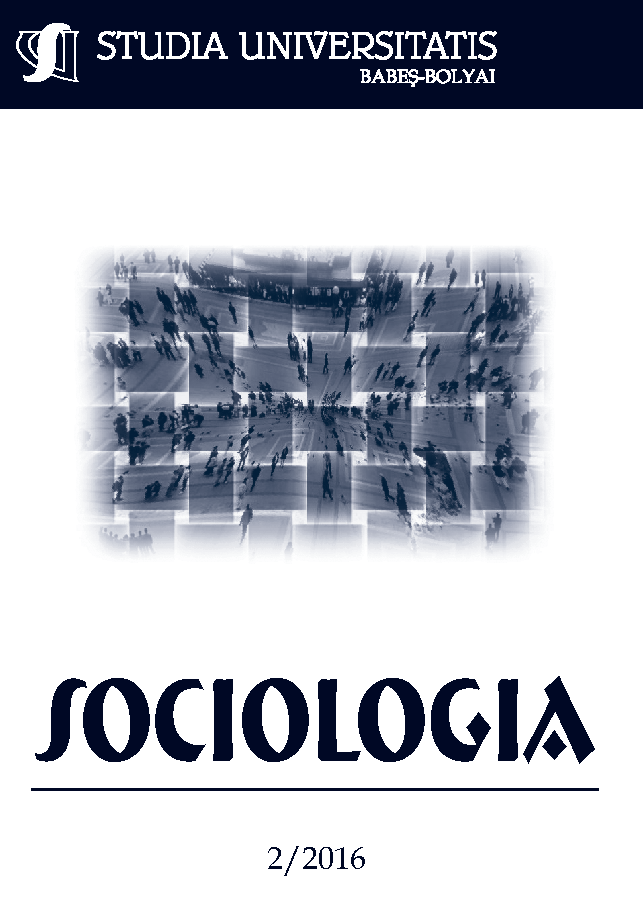ALTERNATIVE FORMS OF SPIRITUALITY AND THE SOCIALIZATION OF A SELF-ENHANCING SUBJECTIVITY: FEATURES OF THE POST-SECULAR RELIGIOUS SPACE IN CONTEMPORARY ROMANIA
Keywords:
religion, alternative spiritualities, spiritual subjectivityAbstract
My paper focuses on the shift in religious values in post-socialist Romania and explores the emergence of alternative spiritual beliefs and practices among the younger generations socialized during the post-communist period. It analyses some of the changes that occurred in the wider traditional religious field and looks at the various spiritualized technologies of the self that produce a distinctive type of religious subjectivity and an immanent ethics of authenticity. By departing from the idea of an integrated religious community and from the relational understanding of religious transformation, the field of alternative spiritualities operates a radical break with traditional religion and emphasizes the possibility of spiritual self-realization and self-discovery. It is this process of the individualizing sacralization of the self that constitutes the object of various workshops, blogs, personal and spiritual development literature, courses, spiritual retreats and counselling services. My research looks at how innovative technologies of the self are developed within these spaces that emphasize creativity, wellbeing and a new understanding of subjective interiority that learns how to find in itself the resources it needs to live in a spiritualized ontology of the present.
References
Adorno, T. (1994). The Stars Down to Earth and Other Essays on the Irrational in Culture. Abingdon: Routledge.
Asad, T. (2003). Formations of the Secular: Christianity, Islam, Modernity. Stanford: Stanford University Press.
Asad, T. (2009). Genealogies of Religion: Discipline and Reasons of Power in Christianity and Islam. Baltimore: JHU Press.
Boltanski, L.; Chiapello E. (2007). The New Spirit of Capitalism. London: Verso.
Carrette, J. R.; King, R. (2005). Selling Spirituality: The Silent Takeover of Religion. London: Psychology Press.
Carrette, J. (2002). Foucault and Religion. London: Routledge.
Carrette, J. (2007). Religion and Critical Psychology: Religious Experience in the Knowledge Economy. London: Routledge.
Foucault, M. (2005). The Hermeneutics of the Subject: Lectures at the Collège de France 1981-1982. Vol. 6. New York: Macmillan.
Foucault, M. (2007) Security, Territory, Population: Lectures at the Collège de France 1977-1978. New York: Picador.
Foucault, M. (2008) The Birth of Biopolitics: Lectures at the Collège de France, 1978-1979. New York: Springer.
Luckmann, T. (1967). The Invisible Religion: The Problem of Religion in Modern Society. New York: Macmillan.
Rose, N. (1990). Governing the Soul: the Shaping of the Private Self. Florence: Taylor & Frances/Routledge.
Rose, N. (1996). Governing ‘Advanced’ Liberal Democracies. In Sharma, A.; Gupta, A. (Eds.). The anthropology of the state: A reader. Malden: Blackwell.
Rose, N. (1998). Inventing our Selves: Psychology, Power, and Personhood. Cambridge: Cambridge University Press.
Taylor, C. (1992). The Ethics of Authenticity. Cambridge: Harvard University Press.
Taylor, C. (2009). A Secular Age. Cambridge: Harvard University Press.
Weber, M. (1978). Economy and Society: An Outline of Interpretive Sociology. Berkeley and Los Angeles: Univ. of California Press.
Downloads
Published
How to Cite
Issue
Section
License
Copyright (c) 2016 Studia Universitatis Babeș-Bolyai Sociologia

This work is licensed under a Creative Commons Attribution-NonCommercial-NoDerivatives 4.0 International License.






